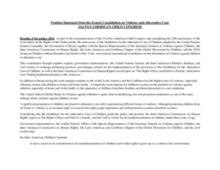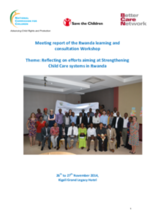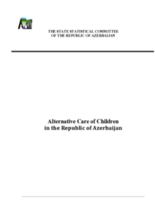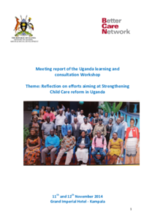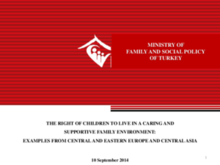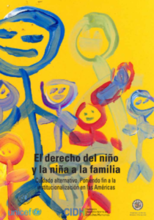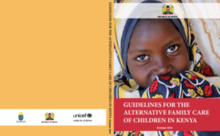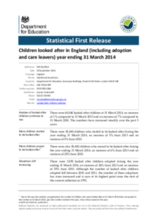Displaying 1831 - 1840 of 2223
In advance of the 21st Pan American Child and Adolescent Congress, an international consultation on the elimination of violence against children in alternative care was convened. This position statement from the consultation was presented at the 21st Pan American Child and Adolescent Congress.
As part of the work of the BCN Eastern and Southern Africa Regional Initiative, the National Commission for Children in partnership with BCN, and Save the Children convened a national consultative workshop in Kigali, Rwanda on 26 and 27 November 2014. This report presents a summary of the main priority outcomes which were identified by participants during the meeting, including: evidence building and sharing, strengthening advocacy, and strengthening capacity.
This report is prepared within the MONEE project of UNICEF Regional Office for CEE/CIS. It provides an overview of alternative care in Azerbaijan.
As part of its Eastern and Southern Africa Regional Initiative, BCN, along with the Ministry of Gender, Labour and Social Development (MGLSD) and the National Child Protection Working Group (CPWG) – an interagency platform of national child protection stakeholders - convened a national consultative workshop on 11 and 12 November 2014. This report from the workshop presents the priorities for action identified by the workshop participants, including: strengthening capacity for family strengthening and alternative care, evidence building and sharing, and strengthening advocacy.
On 10 September 2014, UNICEF and the Permanent Mission of Bulgaria co-hosted a high level Lunchtime Discussion on The right of children below three years to live in a caring and supportive family environment: examples from Central and Eastern Europe and Central Asia. The discussion took place on the margins of the September meeting of the UNICEF Executive Board and brought together over 80 participants, including members of the UNICEF Executive Board, representatives of the Permanent Missions to the UN from the CEE/CIS region, international organizations, NGOs, high level UNICEF and National Committee staff.
El presente Informe, por la Comisión Inter-Americana de los Derechos Humanos, establece los estándares aplicables en el derecho de los niños a vivir en una familia y formula una serie de recomendaciones concretas a los Estados para apoyar a las familias en sus responsabilidades de crianza.
This article assesses the evidence-based programs that are most likely to improve key health and well-being outcomes for teenage mothers in the United States and yields a list that reflects the best evidence for efficacy and effectiveness.
The initial goal of the development of these guidelines was to seek to regulate Guardianship and Foster Care of children in Kenya.
This report includes the statistical information regarding looked-after children in the UK for the year 1 April 2013 to 31 March 2014.
This draft from the Liberian government outlines the protocol and guidelines for responding to children's care issues in the context of Ebola, specifically for the Interim Care Centers (ICC) for children who have come into contact with Ebola.

